情态动词和虚拟语气
中的情态动词和虚拟语气有哪些

中的情态动词和虚拟语气有哪些情态动词(Modal Verbs)是一类特殊的动词,在英语中常用来表达情态、态度、意愿、推测、能力、建议等含义,通常用来修饰其他动词。
而虚拟语气(Subjunctive Mood)是一种用来表示假设、愿望、建议、命令等非现实情况的语气。
情态动词一共有十个,它们分别是can、could、may、might、shall、should、will、would、must、ought to。
这些情态动词在语言表达中起到了很重要的作用,下面将对它们的具体用法进行介绍。
1. Can和CouldCan表示一种能力、可能性或许可性,用于表达某人能够完成某事。
Could表示过去或将来某个时间点的能力或可能性。
例如:- He can speak three languages fluently.(他能够流利地说三种语言。
)- Could you pass me the salt, please?(你能递给我盐吗?)2. May和MightMay表示许可、可能性或祝愿,用于表示允许某事发生或对现实情况的推测。
Might在语气上更加委婉,表达对现实情况的推测,表示较小的可能性。
例如:- May I borrow your pen?(我可以借用一下你的笔吗?)- I may/might go to the party tonight.(我可能今晚去参加派对。
)3. Shall和ShouldShall用于征询意见或提供建议,主要用于第一人称以及第三人称的单数和复数。
Should表示某事做起来更好,用于提出建议、义务或期望。
例如:- Shall we go out for dinner tonight?(我们今晚出去吃饭吧?)- You should take a break and relax.(你应该休息一下,放松一下。
)4. Will和WouldWill表示意愿、决心或预测,表示对未来的确定或实际情况。
高考英语复习知识点:情态动词和虚拟语气及英语作文结尾万能公式

高考英语复习知识点:情态动词和虚拟语气及英语作文结尾万能公式高考英语复习知识点:情态动词和虚拟语气虚拟语气在高考命题中不是重点,但是难点。
考点常集中在含蓄条件句以及主语、宾语从句等特定句型中虚拟语气的使用上,因此考生应熟练掌握含蓄条件句中主从句的时态要求以及一些典型句型中虚拟语气的具体形式。
虚拟语气考点透析考点一、虚拟语气的基本用法1.与现在事实相反的虚拟语气,基本结构为:主语+动词的一般过去时(be动词用were)+其他成分+if+should/would/could...+动词原形+其他成分。
例如:①If it were not for the fact that she ______ sing,I would invite her to the party.A.couldntB.shouldntC.cantD.might not解析句意为:如果不是因为她不会唱歌的事实,我会邀请她来参加那次聚会的。
that从句为同位语从句,描述的是事实,用陈述语气。
正确答案为C。
2.与过去事实相反的虚拟语气,基本结构为:主语+动词的过去完成时+其他成分+if+should/would/could...+have done+其他成分。
例如:If the weather had been better,we could have had a picnic.But it ______ all day.A.rainedB.rainsC.has rainedD.is raining解析句意为:如果天气好的话,我们是能够去野餐的,但是下了一天的雨。
句子前半部分陈述的是与过去事实相反的事情,所以用了虚拟语气。
下了一天的雨是事实,所以用陈述语气。
因为是发生在过去的事实,所以正确答案为A。
3.与将来事实相反的虚拟语气,基本结构为:主语+动词的一般过去时/should do/were to do+其他成分+if+should/would/could...+动词原形+其他成分。
虚拟语气与情态动词的区别及用法解析

虚拟语气与情态动词的区别及用法解析虚拟语气和情态动词是语法中两个不同的概念,但在一些语法规则和用法上有一些相似之处。
虚拟语气是一种用来表示假设、愿望、建议、要求等非现实情况的语气,它并不是真实存在的,而是对虚构的事件或状态进行描述。
而情态动词则是一类用于表示说话人的态度、推测、能力、许可等情态意义的动词。
一、虚拟语气的用法1. 假设虚拟语气经常用于表示虚拟的假设情况,即与事实相反或不可能实现的情况。
常见的虚拟语气形式包括“如果…(过去式)”,“要是…(过去式)”等。
例如:- If I were a bird, I would fly freely in the sky.如果我是一只鸟,我就可以在天空中自由飞翔。
2. 愿望虚拟语气还可以用于表示愿望,即对现实情况的一种虚构或想象。
常见的虚拟语气形式包括“希望…(过去式)”,“但愿…(过去式)”等。
例如:- I wish I had studied harder last night.我希望昨晚学习更努力一些。
3. 建议、要求虚拟语气还可以用于表示建议、要求等情况。
常见的虚拟语气形式包括“(要求、建议)+过去式”。
例如:- The doctor suggested that I take some rest.医生建议我休息一下。
二、情态动词的用法1. 表示能力、推测情态动词可以用来表示说话人的能力或对某种情况的判断。
常见的情态动词有can、could、may、might等。
例如:- She can swim very well.她游泳技术非常好。
2. 表示许可、允许情态动词还可以表示许可或允许的意思。
常见的情态动词有can、may等。
例如:- Can I borrow your pen?我能借用你的笔吗?3. 表示义务、应该情态动词也可以表示说话人对某种行为或义务的责任或要求。
常见的情态动词有should、ought to等。
例如:- You should apologize to him for your mistake.你应该为你的错误向他道歉。
情态动词与虚拟语气(详解版)(新版)
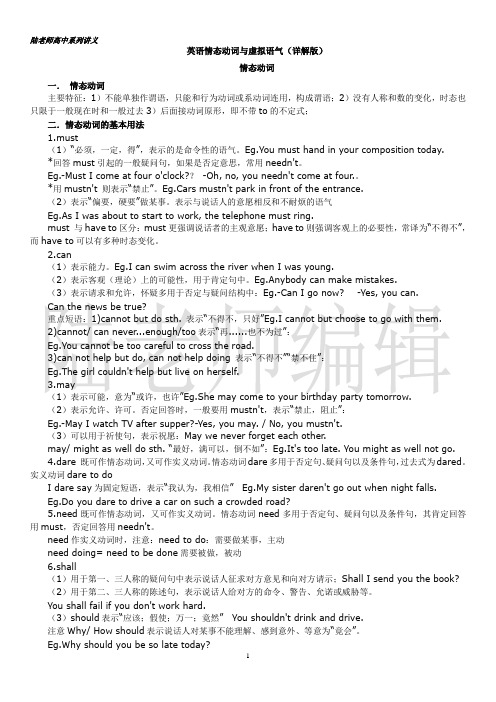
英语情态动词与虚拟语气(详解版)情态动词一.情态动词主要特征:1)不能单独作谓语,只能和行为动词或系动词连用,构成谓语;2)没有人称和数的变化,时态也只限于一般现在时和一般过去3)后面接动词原形,即不带to的不定式;二.情态动词的基本用法1.must(1)“必须,一定,得”,表示的是命令性的语气。
Eg.You must hand in your composition today.*回答must引起的一般疑问句,如果是否定意思,常用needn't。
Eg.-Must I come at four o'clock??-Oh, no, you needn't come at four.。
*用mustn't 则表示“禁止”。
Eg.Cars mustn't park in front of the entrance.(2)表示“偏要,硬要”做某事。
表示与说话人的意愿相反和不耐烦的语气Eg.As I was about to start to work, the telephone must ring.must 与have to区分:must更强调说话者的主观意愿;have to则强调客观上的必要性,常译为“不得不”,而have to可以有多种时态变化。
2.can(1)表示能力。
Eg.I can swim across the river when I was young.(2)表示客观(理论)上的可能性,用于肯定句中。
Eg.Anybody can make mistakes.(3)表示请求和允许,怀疑多用于否定与疑问结构中:Eg.-Can I go now? -Yes, you can.Can the news be true?重点短语:1)cannot but do sth. 表示“不得不,只好”Eg.I cannot but choose to go with them.2)cannot/ can never...enough/too表示“再......也不为过”:Eg.You cannot be too careful to cross the road.3)can not help but do, can not help doing 表示“不得不”“禁不住”:Eg.The girl couldn't help but live on herself.3.may(1)表示可能,意为“或许,也许”Eg.She may come to your birthday party tomorrow.(2)表示允许、许可。
语法专题7情态动词和虚拟语气

语法专题7情态动词和虚拟语⽓情态动词的⽤法情态动词表⽰说话⼈对某⼀动作或状态的态度,可以表⽰“可能”、“可以”、“需要”、“必须”或“应当”等之意。
情态动词没有⼈称和数的变化。
但不能单独作谓语动词⽤,必须和不带to的不定式连⽤构成谓语动词。
只有情态动词ought要和带to的动词不定式连⽤,在句中作谓语⽤。
将情态动词置于主语之前即构成其疑问式,在情态动词之后加not既构成其否定式。
现将各情态动词的基本⽤法分述如下:1、can和could (could为can的过去式) 的基本⽤法(1)表⽰能⼒,如:He can speak English better than you.(2)在疑问句和否定句中表⽰“怀疑”、“猜测”或“可能性”,如:Can thisgreen bike be Liu Dong's?(3)表⽰“许可”时can可以和may换⽤,如:You can (may) go home now.(4)如果要表⽰语⽓婉转,可⽤could代替can,这时could不再是can 的过去式,如:Could you come again tomorrow? (5)can和be able to 都可表⽰能⼒,两者在意思上没有什么区别。
但是can只能有现在式和过去式,⽽be able to则有更多的形式,如:He will be able to do thework better.2、may和might (might为may的过去式)的基本⽤法(1)表⽰允许或征询对⽅许可,有“可以”之意,如:You may use my dictionary. 在回答对⽅说“可以做某事”或“不可以做某事”时,⼀般多不⽤may或may not,以避免语⽓⽣硬或不容⽓。
⽽⽤⽐较婉转的说法进⾏回答。
如:---- May I use this dictionary? ---- Yes, please. 或---- Certainly. 在请求对⽅许可时,如果Might I…? 就⽐⽤May I…? 语⽓更婉转些,如:May I have a look at your new computer? 但是表⽰“阻⽌”或“禁⽌”对⽅做某事时,要⽤must not代替may not,如:---- May we swim in this lake? ---- No, you mustn?t. It?s too dangerous. (2)may或might都可以表⽰可能性,表⽰“或许”、“可能”之意,如果⽤might表⽰可能性,则语⽓更加不肯定,如:They may (might) bein the library now .3、must的基本⽤法(1)must表⽰“必须”、“应该”之意,其否定式must not,缩写形式为mustn't,表⽰“不应该”,“不准”、“不许可”或“禁⽌”之意,如:We must study hard and make progress every day. You mustn't touch the fire. (2)对以must提出的疑问句,如作否定回答时,要⽤needn't或⽤don't (doesn't) have to (不必)来回答,⽽不⽤mustn't,因为mustn't表⽰的是“禁⽌”或“不许可”之意,如:---- Must we finish the work tomorrow? ---- No, you needn't (don't have to), but you must finish it in three days.(3)在肯定句中must可以表⽰推测,表⽰“⼀定”或“必定”之意,如:---- Whose new bike can it be? ---- It must be Liu Dong's. I know hisfather has just bought him a new one.4、can, could, may, must后接完成式的⽤法(1)can, could后接完成式的⽤法:①在否定句或疑问句中表⽰对过去发⽣过的事情的“怀疑”或“不肯定”的态度,Could he have said so? ②在肯定句中,可以表⽰过去可能做到⽽实际并没做到的事情,有“劝告”或“责备”的语⽓。
高中英语语法总结:情态动词和虚拟语气

高中英语语法总结:情态动词和虚拟语气考向1 情态动词一、 can, could与be able to1. 表示能力(体力、知识、技能)。
☞Can you lift this heavy box?(体力)☞Mary can speak three languages.(知识)☞Can you skate?(技能)此时可用be able to代替。
can只有一般现在时和一般过去式;而be able to则有更多的时态。
☞I’ll not be able to come this afternoon.当表示"经过努力才得以做成功某事"时应用be able to,不能用can。
如:☞He was able to go to the party yesterday evening in spite of the heavy rain.2. 表示请求和允许。
☞—Can I go now?—Yes, you can. / No, you can’t. 此时可与may互换。
在疑问句中还可用could, might代替,不是过去式,只是语气更委婉,不能用于肯定句和答语中。
☞—Could I come to see you tomorrow?—Yes, you can. (No, I’m afraid not.)3. 表示客观可能性(客观原因形成的能力)。
☞They’ve changed the timetable, so we can go by bus instead. This hall can hold 500 people at least.4. 表示推测(惊讶、怀疑、不相信的态度),用于疑问句、否定句和感叹句中。
☞Can this be true?☞This can’t be done by him. How can this be true?二、 may, might1. 表示请求和允许。
might比 may语气更委婉,而不是过去式。
语法中的情态动词与虚拟语气的用法

语法中的情态动词与虚拟语气的用法在语法中,情态动词和虚拟语气都是重要的概念。
它们在句子中起到不同的作用,用法也各有特点。
本文将详细介绍情态动词和虚拟语气的用法,并指导读者如何正确运用它们。
一、情态动词的用法情态动词是英语中的一类特殊动词,包括can、could、may、might、shall、should、will、would、must等。
它们通常用来表达说话人的意愿、能力、推测、建议等。
1. 表示能力与可能性情态动词can和could常用来表示能力和可能性。
例如:"She can swim."(她会游泳。
)"I could understand the movie."(我能理解电影。
)在这些句子中,can和could表达了能力与可能性的概念。
2. 表示推测与可能性情态动词may和might用于表示可能性和推测。
例如:"It may rain tomorrow."(明天可能会下雨。
)"She might be late for the meeting."(她可能会迟到会议。
)在这些句子中,may和might表达了对未来事件的推测。
3. 表示义务与建议情态动词should常用于表示义务和建议。
例如:"You should take a break."(你应该休息一下。
)"We should recycle to protect theenvironment."(我们应该回收以保护环境。
)在这些句子中,should表达了建议和应该做的事情。
4. 表示意愿与请求情态动词will和would通常用于表示意愿和请求。
例如:"I will help you with your homework."(我会帮你做作业。
)"Would you please pass me the salt?"(请你递给我盐吗?)在这些句子中,will和would 表达了说话人的意愿和请求。
语法篇专题情态动词和虚拟语气

用法
例句
can和could
表示能力
He can speak English better than you.
表示请求 或允诺?
You can have the book when I have finished it. Could you come again tomorrow?
表示客观可能性
should have done
过去本来应该……,而实际上没有……
The plant is dead. Maybe I should have given it more water.
ought to have done
过去本该……,而未……
You ought to have given him more help.
专题八 情态动词和虚拟语气
情态动词
一、情态动词 定义:情态动词是一种本身具有一定词义,但要与动词原形及其被动语态一起使用的词。它给谓语动词增添情态色彩,表示说话人对有关行为或事物的态度和看法,认为其可能、应该或必要等。 二、情态动词的特点 情态动词无人称和数的变化, 情态动词后面跟的动词需用原形,否定式构成是在情态动词后面加“not”。 个别情态动词有现在式和过去式两种形式, 过去式用来表达更加客气, 委婉的语气, 时态性不强, 可用于过去,现在或将来。情态动词属于非及物动词,故没有被动语态。
三、情态动词的语法特征 (1) 情态动词不能表示正在发生或已经发生的事情,只表示期待或估计某事的发生。 (2) 情态动词除ought 和have 外,后面只能接不带to 的不定式。 (3) 情态动词没有人称和数的变化,即其第三人称单数不加s。 (4) 情态动词没有非限定形式,即没有不定式,分词形式,也没有相应的动名词。 四、情态动词的基本用法
情态动词与虚拟语气

情态动词与虚拟语气【语法要点】情态动词所谓情态动词是指它含有一定的含义,可以表达某种感情和说话的语气,但是它不可以单独使用作谓语动词。
学习情态动词主要学习英语国家的语言习惯和表达法,特别是在口语中不要过分追求原理,更不要不根据说话场合而进行推理,编造出一些语法结构正确的中文式英语。
一、情态动词的类型1.只作情态动词的有:must、can、could、may、might、ought to2.既可作情态动词又可作实义动词的有:need、dare3.既可作情态动词又可作助动词的有:shall、should、will、would二、情态动词的特征>1.表示说话人的情感态度,不能单独作谓语,与行为动词或连系动词一起作谓语。
2.情态动词没有人称和数的变化,后接动词原形。
3.具有助动词的特征:可用来构成否定句、疑问句或简短答语。
三、情态动词的用法1.表示能力(1)表示现在的能力,用can或be able to。
表示一般的能力时多用can,表示“经过努力成功的做成某事”用be able to。
(2)表示过去的能力,用could或was/were be able to。
区别同上。
(3)表示将来的能力,用will be able to。
2.表示推测、可能性(1)can用在肯定句中表示客观的可能性,而不表示具体事情实际发生的可能性。
—例如:Accidents can happy on such rainy days.(2)表示具体事情实际发生的可能性的情态动词,其表示可能性的层次如下表:注意→(1)may,must常用于肯定句,一般不用于否定句和疑问句。
(2)can常用于否定句,疑问句和感叹句中,表示疑惑、惊讶或不相信等意思。
could既可用于肯定句,又可用于否定句、疑问句中。
(3)would、could、should、might并不一定与过去时间有关,而是表示可能性弱于其相对应的现在时形式。
3.表示请求、允许、允诺(1)当你(们)代表你(你们)自己(I、we)或第三者(he、she、they)向对方(you)即决策者请示或提出建议时,使用:①shall/may/might/can/could I/We…②Shall he(she/they)…#③Would/Will/Could/Can you…could、might、would并不表示过去时间,而表示更委婉的语气。
情态动词和虚拟语气

谓语动词(情态动词、虚拟语气)要点一情态动词的基本用法【温馨提示】can有时也用于肯定句,表示理论上的可能性或一时的情况。
常译为“有时会”。
2.may,might【温馨提示】may表示请求许可时,其否定回答一般用mustn’t。
may not意为“可能不”,而can’t意为“不可能”。
【温馨提示】would表示过去的习惯时仅指动作,而且不与现在作对比;used to表示过去的习惯动作或状态,而且与现在作对比,说明现在这种动作或状态已经不存在。
4.shall,should,ought to5.must,have to【温馨提示】 (1)在回答must 的问句时,否定回答通常用needn ’t 或don ’t have to 。
(2) mustn ’t 表示“禁止;不许”;而don ’t have to 表示“不必”。
(3) must 只有一种形式,而have to 有人称、时态的变化。
6.need 的用法7.dare 的用法【温馨提示】(1)dare用作情态动词有dare,dared两种形式。
(2)dare用作实义动词,后接不定式,不定式符号to可省去,但dare以动词-ing形式出现时,不定式符号to不能省略。
要点二“情态动词+have done ”的用法1.must have done表示对过去已发生的事情进行肯定的推断,只用于肯定句中,意为“一定,必定”,其否定形式为:can’t/cannot have done。
It must have rained last night,for the road was quite wet.昨晚肯定下雨了,因为路面十分潮湿。
I saw Mr Wang just now.He can’t have gone abroad.刚刚我还看见王先生了,他不可能已经出国了。
2.could have done意为“本来可以……,本来能够……”,表示虚拟语气。
You could have made greater progress,but you didn’t try your best.你本来可以取得更大的进步,但是你没有努力。
情态动词与虚拟语气
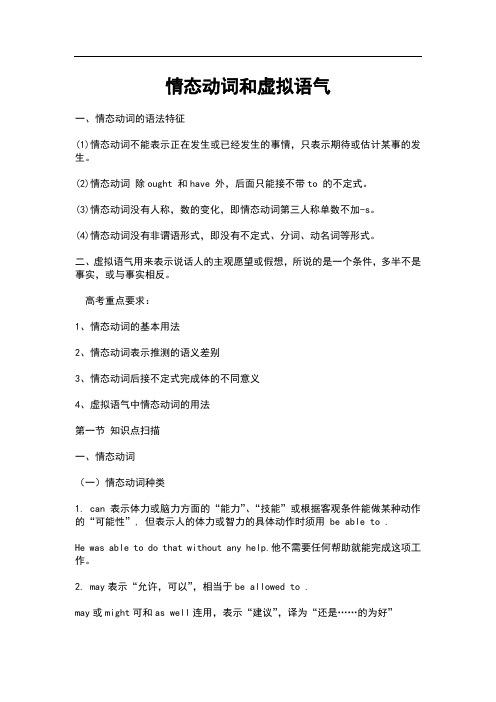
情态动词和虚拟语气一、情态动词的语法特征(1)情态动词不能表示正在发生或已经发生的事情,只表示期待或估计某事的发生。
(2)情态动词除ought 和have 外,后面只能接不带to 的不定式。
(3)情态动词没有人称,数的变化,即情态动词第三人称单数不加-s。
(4)情态动词没有非谓语形式,即没有不定式、分词、动名词等形式。
二、虚拟语气用来表示说话人的主观愿望或假想,所说的是一个条件,多半不是事实,或与事实相反。
高考重点要求:1、情态动词的基本用法2、情态动词表示推测的语义差别3、情态动词后接不定式完成体的不同意义4、虚拟语气中情态动词的用法第一节知识点扫描一、情态动词(一)情态动词种类1. can表示体力或脑力方面的“能力”、“技能”或根据客观条件能做某种动作的“可能性”, 但表示人的体力或智力的具体动作时须用 be able to .He was able to do that without any help.他不需要任何帮助就能完成这项工作。
2. may表示“允许,可以”,相当于be allowed to .may或might可和as well连用,表示“建议”,译为“还是……的为好”You may as well keep a certain distance from that mad man. 你们还是离那疯子远点为好。
You might as well go home now.你还是现在回家为好。
3. must表示“必须”或“应当”、“一定”。
4. have to 加动词原形,表示“不得不”,“必须”,它比must更强调客观。
Tom had to work into the deep night every day to earn a living. 汤姆为了生计每天都得工作到深夜。
5. should 表示“劝告”,“建议”或“义务”时,译作“应当”,或表示“预测”和“可能”。
He should take care of his parents as they are old enough not to live on themselves. 由于父母亲老了,不能自理,他应当照顾他们。
突破08 情态动词与虚拟语气(通用版)
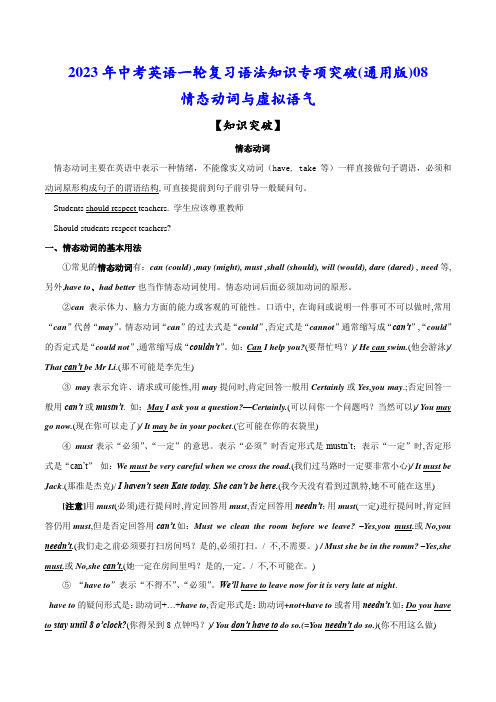
2023年中考英语一轮复习语法知识专项突破(通用版)08情态动词与虚拟语气【知识突破】情态动词情态动词主要在英语中表示一种情绪,不能像实义动词(have, take等)一样直接做句子谓语,必须和动词原形构成句子的谓语结构,可直接提前到句子前引导一般疑问句。
Students should respect teachers. 学生应该尊重教师Should students respect teachers?一、情态动词的基本用法①常见的情态动词有:can (could) ,may (might), must ,shall (should), will (would), dare (dared) , need等,另外,have to、had better也当作情态动词使用。
情态动词后面必须加动词的原形。
②can表示体力、脑力方面的能力或客观的可能性。
口语中, 在询问或说明一件事可不可以做时,常用“can”代替“may”。
情态动词“can”的过去式是“could”,否定式是“cannot”通常缩写成“can’t”,“could”的否定式是“could not”,通常缩写成“couldn’t”。
如:Can I help you?(要帮忙吗?)/ He can swim.(他会游泳)/ That can’t be Mr Li.(那不可能是李先生)③may表示允许、请求或可能性,用may提问时,肯定回答一般用Certainly或Yes,you may.;否定回答一般用can’t或mustn’t. 如:May I ask you a question?—Certainly.(可以问你一个问题吗?当然可以)/ You may go now.(现在你可以走了)/ It may be in your pocket.(它可能在你的衣袋里)④must表示“必须”、“一定”的意思。
表示“必须”时否定形式是mustn’t;表示“一定”时,否定形式是“can’t”如:We must be very careful when we cross the road.(我们过马路时一定要非常小心)/ It must be Jack.(那准是杰克)/ I haven’t seen Kate today. She can’t be here.(我今天没有看到过凯特,她不可能在这里) [注意]用must(必须)进行提问时,肯定回答用must,否定回答用needn’t;用must(一定)进行提问时,肯定回答仍用must,但是否定回答用can’t.如:Must we clean the room before we leave? –Yes,you must.或No,you needn’t.(我们走之前必须要打扫房间吗?是的,必须打扫。
情态动词与虚拟语气

情态动词与虚拟语气情态动词是英语中一类特殊的动词,它们用于表达说话人的情态、态度、能力、推测和意愿等,如can、could、may、might、shall、should、will、would、must等。
而虚拟语气则是一种语法形式,用来表示非真实、假设、愿望、建议、命令等。
情态动词和虚拟语气常常结合使用,以表达一定的假设、愿望或建议等含义。
一、情态动词的用法1. 表示能力和许可:can、could、may、might情态动词can表示一种能力或技能,表示某人有能力完成某事。
例如:He can play the piano very well.(他弹钢琴弹得很好。
)情态动词could表示过去的能力或技能,常用于否定句或疑问句中。
例如:I couldn't find my keys this morning.(今天早上我找不到我的钥匙。
)情态动词may和might表示允许或许可的意思,也可以表示推测或猜测。
注意may是一种程度上更强的允许,而might则程度上会稍微弱一些。
例如:You may leave the party early if you want.(如果你愿意,你可以早点离开派对。
)I might go to the movies tonight.(今晚我可能去看电影。
)2. 表示推测和猜测:must、should、would情态动词must表示说话人确定的推测和猜测,表示事实的推测,带有较强的肯定意义。
例如:She must be tired after running a marathon.(她参加完马拉松赛后一定很累。
)情态动词should表示一种合理的推测和猜测,表示根据某种常理或按照经验而做出的推测。
例如:He should be at home now because he usually comes back at this time.(他应该在家,因为他通常在这个时间回来。
高中英语2025届高考语法复习情态动词与虚拟语气知识讲解
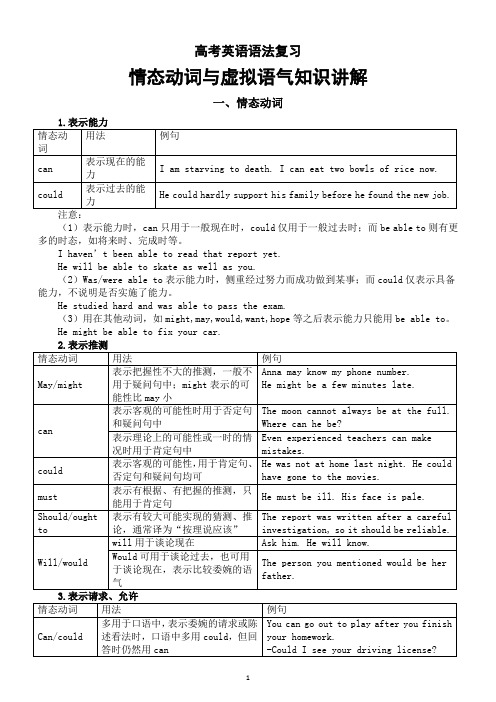
高考英语语法复习情态动词与虚拟语气知识讲解一、情态动词(1)表示能力时,can只用于一般现在时,could仅用于一般过去时;而be able to则有更多的时态,如将来时、完成时等。
I haven’t been able to read that report yet.He will be able to skate as well as you.(2)Was/were able to表示能力时,侧重经过努力而成功做到某事;而could仅表示具备能力,不说明是否实施了能力。
He studied hard and was able to pass the exam.(3)用在其他动词,如might,may,would,want,hope等之后表示能力只能用be able to。
He might be able to fix your car.(1)must还可以表示质问或感情色彩,意为“偏要,偏偏”。
Why must it snow on Saturday?(2)should还可以表示惊奇、愤怒、失望等特殊情感,尤其用在以why,who,how等开头的疑问句中或某些感叹句中。
why should you be so late today?(1)must作“必须”讲的一般疑问句,其肯定回答用must,否定回答用needn’t或don’t have to。
-Must I pay now?-Yes, you must./No, you needn’t.(2)need还可以作实义动词,有人称和数的变化,后跟带to的不定式作宾语。
She needed to go out for a walk.(1)两者在表示过去的习惯动作或行为时常可通用。
When we were children, we would/used to go skating every winter.(2)Used to与would都不能与表示具体频率、次数的词及特定的时间状语或具体的一段时间连用。
情态动词与虚拟语气

情态动词与虚拟语气(一) 情态动词的基本用法1. can be able to could①can 和 be able to 都表示能力,意思上没多大区别。
但 can 只有现在和过去时,而 be able to 则有更多的形式。
但当成功地完成某一具体动作时,通常不用 could 而用was/were able to 来表示。
这时 was/were able to 相当于 managed to或succeeded in ,表示经过一番努力,终于能够完成某事。
如:The wounded man still was able to get to the village and was saved in the end.②can 和 could: can 和 could 都可以表示能力、技能、许可、建议或请求和可能性。
但比较委婉客气地提出问题或陈述看法,一般用 could,回答时则用 can。
如: Could you help me carry the bag? Can I help you?2. may/might①may/might 表示可能,但 may 比 might 可能性大。
如:—Why isn't he in class? —He may be sick.(生病的可能性较大) He might be sick.(生病的可能性较小)②may/might 表示"允许",may 用于现在时或将来时,might 常用在间接引语中表过去时,但 might 也可用于现在时间,表示比较委婉的语气,回答用 may。
如: He says we may leave. He said we might leave.③may / might 表示建议或请求, might 比 may 更客气,但意思更肯定而无过去时态的含义。
如:---May / Might I use your bike?---Yes, you can / may/ No,you mustn’t3. must /have to①must 表示必须,应该,强调主观意愿,没有时态变化。
情态动词和虚拟语气
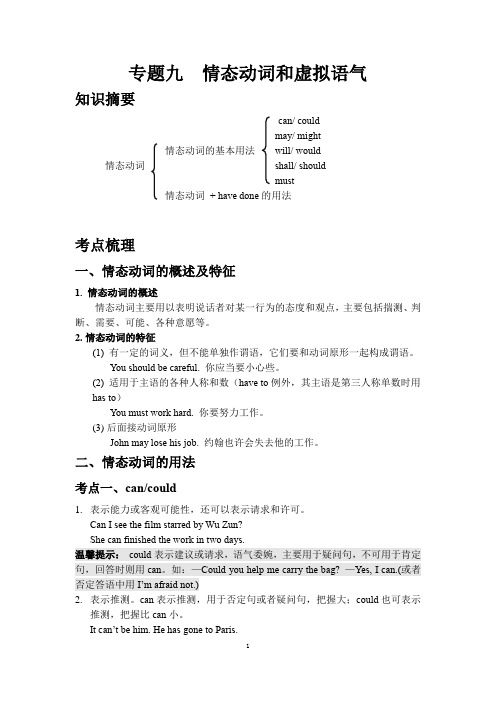
专题九情态动词和虚拟语气知识摘要can/ couldmay/ might情态动词的基本用法will/ would情态动词shall/ shouldmust情态动词+ have done的用法考点梳理一、情态动词的概述及特征1. 情态动词的概述情态动词主要用以表明说话者对某一行为的态度和观点,主要包括揣测、判断、需要、可能、各种意愿等。
2.情态动词的特征(1) 有一定的词义,但不能单独作谓语,它们要和动词原形一起构成谓语。
You should be careful. 你应当要小心些。
(2) 适用于主语的各种人称和数(have to例外,其主语是第三人称单数时用has to)You must work hard. 你要努力工作。
(3)后面接动词原形John may lose his job. 约翰也许会失去他的工作。
二、情态动词的用法考点一、can/could1.表示能力或客观可能性,还可以表示请求和许可。
Can I see the film starred by Wu Zun?She can finished the work in two days.温馨提示:could表示建议或请求,语气委婉,主要用于疑问句,不可用于肯定句,回答时则用can。
如:—Could you help me carry the bag? —Yes, I can.(或者否定答语中用I’m afraid not.)2.表示推测。
can表示推测,用于否定句或者疑问句,把握大;could也可表示推测,把握比can小。
It can’t be him. He has gone to Paris.Look! Someone is coming! Who can it be?3.用于陈述句中,表示理论上或者习惯上的可能性。
It can be quite cold here in winter.It could be very exciting to go out for a drive.【知识拓展】1. 辨析:can、be able to 和could(1)can只有现在和过去时,而be able to则有更多的时态变化。
- 1、下载文档前请自行甄别文档内容的完整性,平台不提供额外的编辑、内容补充、找答案等附加服务。
- 2、"仅部分预览"的文档,不可在线预览部分如存在完整性等问题,可反馈申请退款(可完整预览的文档不适用该条件!)。
- 3、如文档侵犯您的权益,请联系客服反馈,我们会尽快为您处理(人工客服工作时间:9:00-18:30)。
情态动词和虚拟语气
情态动词的用法要点
一、表能力
Can
Am/is/are able to 表现在的能力
Will be able to 表将来的能力
could
Was/were able to 表过去得能力
Could have+过去分词:表示过去有能力做但未做
二、表推测(可能性)
1.可能性可分为客观的可能性和具体事情实际发生的可能性两种。
所谓客观的(理论的)可能性即并不涉及
具体某事是否会发生,此种用法常常可以说明人或事物的特征。
情态动词can可用于肯定句中表示客观的(理论的)可能性,而表示具体事情实际发生的可能性时,can一般不用于肯定句。
Accidents can happen on such rainy days.
We may go to the cinema tonight, but we are not sure yet.
2.表示具体事情实际发生的可能性:
(2)表示具体事情实际发生的可能性时,may, must 常用于肯定句,一般不用于否定句和疑问句(may not 表示“可能不”);can常用于否定句、疑问句或感叹句中,表示疑惑、惊讶或不相信等意思;could既可用于肯定句又可用于否定句、疑问句中。
This can’t/ couldn’t be done by him.
This may not be done by him.
He could be on his way home now.
Can this be done by him?
Mr Mush is on time for everything. How can it be that he was late for the opening ceremony?
I didn’t hear the phone. I must have been asleep.
---Are you coming to Jeff’party?
---I’m not sure. I might go to the concert instead.
(3) would, could, should, might 并不一定与过去时间有关,而表示可能性弱于它们相应的现在时形式。
This may/ might be done by him.
(4)should 表推测时,表示确定或可能有的未来或期望,即合乎理想的情况或结果
He ought to/ should be here on time---he started early enough.
We should arrive before dark.
The roads should be less crowded today.
三、表示请求、允许、允诺
1.当对方是决策者时,你代表你(们)自己(I, we),或代表第三者(he she they)向对方(you)请示或提
出建议时用:
(1) Shall/ May/ Might/ Can/ Could I/ we ……? (2) Shall he/ she/ they …….? (3) Would/ Will you ……? Shall the driver wait outside?
When shall my father be able to leave hospital? Would you do me a favor?
2. could/ might/ would/ should 表委婉的语气 ---Could/ Might I use your bike tomorrow morning? ---Yes, you can/ may.
3. shall 还可以表命令、警告、威胁;宣布法律、规定时,也要用shall You shall leave the room at once, and he also shall.
It has been announced that candidates shall remain in their seats until all the papers have been collected. 四、表示必要性
1. must 常用来表示必要性,意为“必须”
(1) must+do sth.
(2) Don ’t have to do sth ./ don’t need to do sth./ needn ’t do sth (3) 表示过去没必要做某事时,分为以下情况: ① needn ’t have done sth.
② Didn ’t have to do sth/ didn ’t need to do sth/ It was not necessary to do sth. You needn ’t have worked that late last night. It was harmful to your health. ---Did you work very late last night?
---No, I didn ’t. I didn ’t need to work very late. Mustn ’t 意为“绝对不能,被禁止” You must n’t smoke here.
2. should 也可以表示必要性,意为“(义务上)应该”。
Should 表示必要性时,在语气上比must(必须)弱。
“should +动词原形”,表示现在或将来应该做(的必要性);“should+ have+ 过去分词”,表示过去本该做(的必要性)
I should go and visit him this afternoon, but I wonder if I will be free.
You should have come to the conference yesterday. What was the reason for your absence? 五、表示“宁愿做某事”时,可使用下面这些句式: Would rather do sth.
Would rather do sth.than sth. Would do sth. Rather than do sth. Would rather sb. Did sth. Prefer to do sth.
Prefer to do sth. Rather than do sth Prefer doing sth. To doing sth.
六、情态动词的其他用法要点:
1.cannot but +do sth.表示“不得不/只好做某事”
I cannot but choose to go.
2. may well 和may as well结构
(1)“may well + 动词原形”是一种常用结构,意为“完全能,很可能”,相当于“be very likely to +动词原形”
He may well be proud of his son.
Her appearance has changed so much that you may well not recognize her.
(2) “may as well + 动词原形”意为“最好,满可以,倒不如”
You may as well do it at once.
We may as well stay where we are.
3.cannot (或can never 等)与enough 连用表示“再….也不为过”
4.may 可以用于祈使句,表示祝愿
May we never forget each other.
May you return in safety.
5.Why/ how + should结构表示说话人对某事不能理解,感到意外、惊讶等意思,意为“竟会”
Why should you be so late today?
How should I know?
6. must 表示“偏要、硬要“
Must you make so much noise?
If you must smoke, please go out.
7. may 作“可以”讲时,其否定式常用mustn’t 表示“禁止”;must 作必须讲时,其否定式是needn’t, 表示“不必”
8. be able to 还有“设法做成”之意,相当于manage to do 或succeed in doing
Many people were able to escape from the fire.
9.need 和dare 的用法
Need 和dare 两者既可用作情态动词也可用作行为动词。
作行为动词时,有人称和数的变化,可用于肯定句、否定句或疑问句中,构成否定句或疑问句时要用助动词do, does, did;作情态动词时,没有人称和数的变化(dare 的过去式为dared),直接接动词原形,只用于否定句和疑问句中,构成否定句和疑问句时不用助动词。
另外,dare作情态动词时,还可用于条件句中,过去式为dared;作行为动词时,dare常用于疑问句或否定句,后面的to也可省略;Idare say 是习惯说法,意为“我想,大概”。
